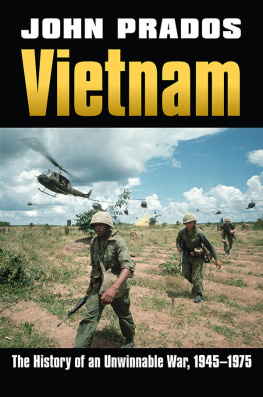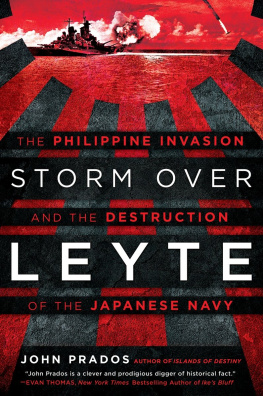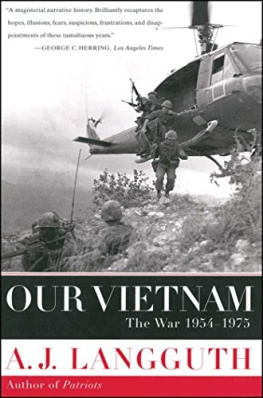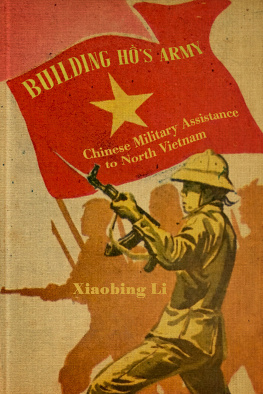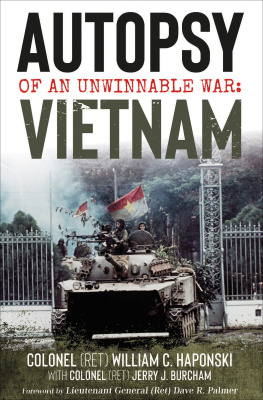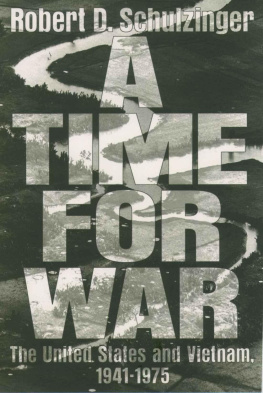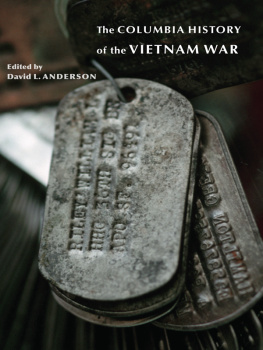Vietnam
M ODERN W AR S TUDIES
Theodore A. Wilson
General Editor
Raymond Callahan
J. Garry Clifford
Jacob W. Kipp
Allan R. Millett
Carol Reardon
Dennis Showalter
David R. Stone
Series Editors
Vietnam
The History of an Unwinnable War, 19451975
John Prados

2009 by the University Press of Kansas
All rights reserved
Published by the University Press of Kansas (Lawrence, Kansas 66045), which was organized by the Kansas Board of Regents and is operated and funded by Emporia State University, Fort Hays State University, Kansas State University, Pittsburg State University, the University of Kansas, and Wichita State University
Library of Congress Cataloging-in-Publication Data
Prados, John.
Vietnam : the history of an unwinnable war, 19451975 / John Prados.
p. cm. (Modern war studies)
Includes bibliographical references and index.
ISBN 978-0-7006-1634-3 (cloth : alk. paper)
ISBN 978-0-7006-1940-5 (pbk. : alk. paper)
ISBN 978-0-7006-2363-1 (ebook)
1. Vietnam War, 19611975United States. 2. United StatesPolitics and government
19451989. 3. United StatesHistory1945 I. Title.
DS558.P743 2009
959.7043dc22
2008051204
British Library Cataloguing-in-Publication Data is available.
Printed in the United States of America
10 9 8 7 6 5 4 3 2 1
The paper used in this publication is recycled and contains 30 percent postconsumer waste. It is acid free and meets the minimum requirements of the American National Standard for Permanence of Paper for Printed Library Materials Z39.48-1992.
FOR ELLEN
Who saw at the beginning
and carried her candle in the dark
ALSO BY JOHN PRADOS
Safe for Democracy: The Secret Wars of the CIA
Hoodwinked: The Documents That Reveal How Bush Sold Us a War
Inside the Pentagon Papers (with Margaret Pratt Porter)
The White House Tapes: Eavesdropping on the President
Lost Crusader: The Secret Wars of CIA Director William Colby
Operation Vulture
America Confronts Terrorism
The Blood Road: The Ho Chi Minh Trail and the Vietnam War
Presidents Secret Wars: CIA and Pentagon Covert Operations from World War II through the Persian Gulf
Combined Fleet Decoded: The Secret History of U.S. Intelligence and the Japanese Navy in World War II
The Hidden History of the Vietnam War
Valley of Decision: The Siege of Khe Sanh (with Ray W. Stubbe)
Keepers of the Keys: A History of the National Security Council from Truman to Bush
Pentagon Games
The Soviet Estimate: U.S. Intelligence and Soviet Strategic Forces
The Sky Would Fall: The Secret U.S. Bombing Mission to Vietnam, 1954
BATTLE HYMN OF THE REPUBLIC
Mine eyes have seen the glory of the coming of the Lord
He is trampling out the vintage where the grapes of wrath are stored,
He has loosed the fateful lightning of His terrible swift sword
His truth is marching on.
Chorus: Glory! Glory! Hallelujah!
Glory! Glory! Hallelujah!
Glory! Glory! Hallelujah! His truth is marching on.
I have seen Him in the watch-fires of a hundred circling camps
They have builded Him an altar in the evening dews and damps
I can read His righteous sentence by the dim and flaring lamps
His day is marching on.
Chorus
I have read a fiery gospel writ in burnishd rows of steel
As ye deal with my contemners, So with you my grace shall deal;
Let the Hero born of woman, crush the serpent with his heel
Since God is marching on.
Chorus
He has sounded forth the trumpet that shall never call retreat
He is sifting out the hearts of men before His judgment-seat
Oh be swift, my soul, to answer Him! Be jubilant my feet!
Our God is marching on.
Chorus
In the beauty of the lilies Christ was born across the sea,
With a glory in His bosom that transfigures you and me:
As He died to make men holy, let us die to make men free,
While God is marching on.
Chorus
Julia Ward Howe
Contents
Preface
After spending years asserting that there was no similarity between Iraq and Vietnam, in August 2007 President George W. Bush switched and began using analogy to Vietnam to explain why the Iraq war needed to be continued. Bush did this without any deep reflection and without taking into account the fact that the Vietnam war is still disputed historical terrain. Never mind the conflations and mischaracterizations of this presidents presentation of the past. The fact that he called up Vietnam as justification raises its own questions about the role of that conflict as analogy and the realities behind the mythology that has grown around it. We understand that history unrolls as tragedy and repeats as farce. Vietnam was certainly a tragedy. The question that continues to permeate that conflict, accounting for much of the mythology, is whether it was all inevitable. Was Vietnam an unwinnable war? What does that make Iraq?
Although there have been survey histories of the Vietnam war in the past, current efforts to rely on that conflict as historical analogy for Iraq indicate the need for a fresh review. In addition, most existing accounts were written prior to the declassification of large swaths of records of presidents Richard M. Nixon and Gerald R. Ford, who led the United States during the later phases of the war; these records are especially important because allusions to success in Vietnam are based on that period. This is not to say that earlier events, some as early as the 1950s, were not crucial to the outcome, indicating the necessity for a new broad overview. Histories also pass lightly over certain actions that need to be placed in proper relation to the whole to fully appreciate the unfolding American experience in Vietnam. In particular, this account presents evidence that developments during the Eisenhower administration in 19541955 not only conditioned later events but also played a key role in the minds of central actors.
As will become evident, the core argument advanced here is that, whatever the intentions and aims of American leaders, the United States acted within a context defined along political, military, foreign policy, social, and economic dimensionsin effect, an envelopeand that envelope narrowed over time due to developments in all those fields. The narrative shows how and why the range of potential choices constricted, as well as which choices were influenced by individual agency, ambition, and misunderstanding of the wars reality or, as the Soviets used to say, the true correlation of forces.
I believe the Vietnam war remains contested historical terrain in large part because observers have presented atomized views. Some write of the agonies of presidents facing crucial decisions at particular moments in time. These accounts emphasize short-range thinking. They frequently allude to long-range impact but still present only a limited slice of the relevant history. Others approach the war as simple military conflict and write of campaigns and battles. With a few exceptions, Americans won all the battles. So how did the United States lose the war? A few accounts combine a battle with a view of the home front, but again, the scope is restricted. Others approach the issue as a technical problem of military doctrine and argue that better strategy and tactics could have led to a different outcome. Some try to explain defeat by focusing on North Vietnam, usually depicted as a warrior state thrusting across international borders and invading the territory of those the United States sought to support. Still others account for the outcome by writing of the American political movement that opposed the war, blaming that for the failure. Variants of that theme include implicating the media in the defeat for not reporting positive news about the war, or charging Congress with running away from its responsibilities and not allocating the necessary funds. What all these visions of Vietnam have in common is that they consider only pieces of the puzzle, extrapolating general conclusions from very narrow bases of evidence. They are atomized views.

